This column appeared in The Daily Signal on August 31, 2018.
Incomes in America rose to a new high in 2017 despite the constant talking points that the economy is only working for a few.
According to the latest data from the Census Bureau, American households have made their way solidly out of the recession and incomes continue to rise. And the report includes other significant data: Income inequality is more of a talking point than a reality and middle-income earners are actually moving up the economic ladder, not down. All while, the price of consumer goods continues to go down.
Median household income
Median household income last year was $61,372, an increase of 1.8 percent from the previous year in today’s dollars. This is the fifth consecutive annual increase after a half-decade of declines following the Great Recession. The last period of four consecutive gains was in the late 1990s.
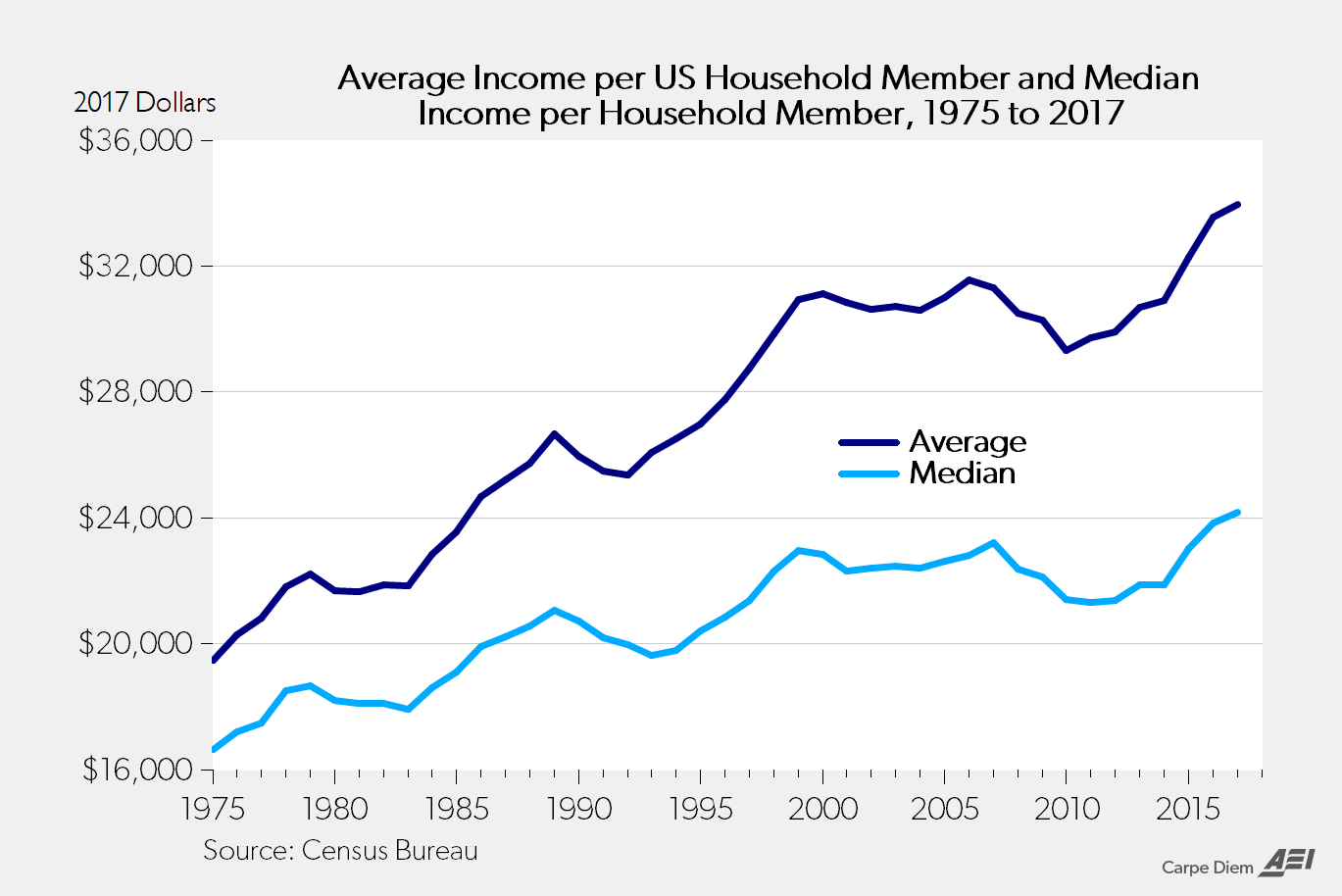
Compared to 1975, annual incomes per household member, again in today’s dollars, are up more than $12,000. That means each America has an additional $1,000 in additional income per month than they did forty years ago.
Income inequality

One of the most common refrains we hear in politics today is about the rising income gap. It has spurred a new belief in socialism, and propelled the candidacy of Democratic-Socialist Bernie Sanders in 2016. Other have since followed in his footsteps.
President Barack Obama once called it the “defining challenge of our time.”
Two data points show that the shares of total income earned by the top 20 percent and the top 5 percent are relatively static. Meaning, the rich aren’t getting richer at the expense of everyone else. Over the past two decades, the income shares of the top 20 percent and the top 5 percent have remained stable at 49-51 percent and 21-22 percent, respectively.
As the chart shows, these percentages are relatively static during this time.
The middle class
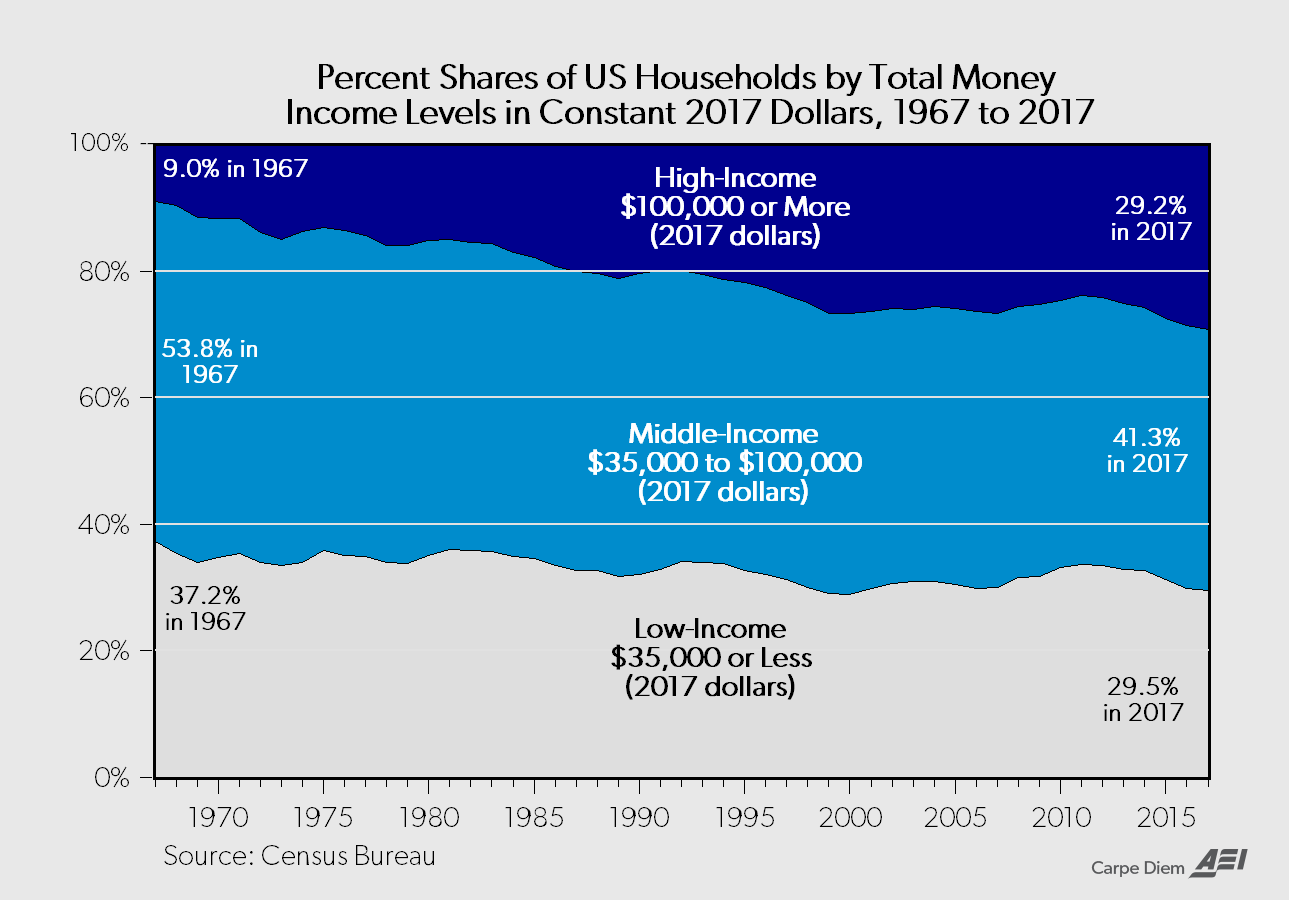
Another common refrain is the disappearing middle class. After all, in 1967 53.8 percent of the population was considered middle income, those who make between $35,000-$100,000 (in today’s dollars). But the middle class is getting smaller because they are moving up to higher income groups. That is a good thing.
The size of high-income earners, those who make $100,000 or more is 29.2 percent. Forty years ago, only 9 percent fit in this category. That represents a growth of high earners of 224 percent. Meanwhile the share of low-income earners, those who make $35,000 or less, has fallen from 37.2 percent in 1967 to 29.5 percent today. A decrease of 20 percent.
Price of consumer goods
Usually involved in this discussion is the fact that everything seems much more expensive than it was a few decades ago. A lot of this is nostalgia, but there are some items that are indeed more expensive, significantly more so in many cases. That primarily includes healthcare and higher education, two sectors of the economy that are heavily regulated and influenced by the government.
Housing, which is often negatively impacted (in terms of cost to the consumer) by local government regulations, has largely kept pace with inflation.
But most every day consumer goods, everything from cars and home furnishings to appliances and clothing, have become more affordable. What do these goods have in common? They are controlled by the free market, not the government.
For some, they may be struggling. They may not have bounced back from the recession or perhaps life choices put them in a less-than-desirable situation. But we know, when we move past the talking points and political campaigns, Americans have never been doing better. The middle class isn’t shrinking. It’s getting wealthier. Incomes are not growing apart. And every day purchases aren’t getting more expensive.
Thanks to capitalism and the free market.
Preliminary data shows that overall enrollment in Mississippi’s eight public universities and 15 community and junior colleges is down over the previous year.
Enrollment for the fall of 2018 stands at 80,592, compared to 81,378 last year.
Among Mississippi’s eight public universities, enrollment is up at Alcorn State, Mississippi State, Mississippi Valley State, and Southern Mississippi. Enrollment is down at the other four universities: Delta State, Jackson State, Mississippi University for Women, and Ole Miss.
Southern Miss enjoyed the largest growth, from 14,478 students to 14,743, an increase of 1.8 percent. Their freshman class grew from 1,903 students last year to 2,115 this year. Mississippi State grew by 1.5 percent, from 21,883 students to 22,201. State’s freshman class grew from 3,438 students to 3,599.
Ole Miss, including enrollment at the University of Mississippi Medical Center in Jackson, has the largest enrollment in the state at 23,258. That is down 2.2 percent from last year when the system enrolled 23,780 students. This is the second consecutive year of a decline. Last year’s enrollment was down 1.9 percent. The freshman class at Ole Miss is down 6.5 percent, from 3,697 students to 3,455.
The biggest drop, however, was at Jackson State. Enrollment is down to 7,709 from 8,558 last year. This represents at 9.9 percent decrease.
Total student enrollment, Fall 2017 compared to Fall 2018
| Institution | 2017 | 2018 | Number change | % change |
| Alcorn State | 3,716 | 3,753 | 37 | 1% |
| Delta State | 3,789 | 3,784 | -5 | -0.1% |
| Jackson State | 8,558 | 7,709 | -849 | -9.9% |
| MSU | 21,883 | 22,201 | 318 | 1.5% |
| MUW | 2,789 | 2,738 | -51 | -1.8% |
| MVSU | 2,385 | 2,406 | 21 | 0.9% |
| Ole Miss | 23,780 | 23,258 | -522 | -2.2% |
| Southern | 14,478 | 14,743 | 265 | 1.8% |
| Totals | 81,378 | 80,592 | -786 | -1% |
Enrollment among Mississippi’s 15 junior and community colleges fell to 72,255, a decline of 0.8 percent from the previous year. Pearl River (2.6 percent), Southwest Mississippi (2.9 percent), Northeast Mississippi (2.9 percent), and Mississippi Delta (3.2 percent) were the largest gainers.
Coahoma (-5.2 percent), Northwest Mississippi (-5.8 percent), and Meridian (-6.3 percent) had the biggest drop percentage wise. Hinds, whose enrollment was flat, remains the largest school in the community college system at 11,833 students.
The city of Tupelo is in the process of drafting new regulations for food truck operators within the city limits.
According to the Daily Journal, city leaders hope to have an ordinance before the council in October. This has been in the works for some time now, with leaders talking about food truck regulations back in May.
At that time, Councilman Willie Jennings said, in proposing the regulations, “I just want to make sure the established businesses are protected.” Another councilman, Markel Whittington, said brick-and-mortar restaurants have requested food truck regulations. While he didn’t feel food trucks posed a ‘threat’ to those restaurants, he believed it was appropriate for government to act ‘on behalf of select business interests.’
“I think we have to protect some of our taxpayers and high employers,” he said.
The proposed ordinance would likely prohibit food trucks from operating on public property along major thoroughfares. Major thoroughfares include virtually all of Main and Gloster streets, two of the most prominent retail areas in the city.
And they also happen to be where most food trucks are currently located.
When Tupelo leaders began discussing food truck regulations, Mississippi Justice Institute, the legal arm of Mississippi Center for Public Policy, sent a letter to the city warning of litigation if these regulations passed.
“The very regulation Tupelo is discussing—a regulation about how close a food truck should be to a restaurant—was found to be unenforceable just this past December in Baltimore. Food truck regulations around the country have been challenged over and over in court, from Louisville, to San Antonio, to Chicago, and many places in between. Cities ultimately realize that these kinds of cases are very hard to defend,” the letter said.
More recently, the city of Carolina Beach, North Carolina repealed it’s prohibition on out-of-town food trucks from serving the city after a lawsuit was filed by the Institute of Justice. Under the law that has since been scrapped, only brick-and-mortar restaurants that have been in business for more than one year could run a food truck.
“It is a shame that it took a lawsuit to convince the town to repeal such an obviously unconstitutional law,” Justin Pearson, senior attorney at IJ said. “I’m hopeful that this vote will signal the end to the town’s attempt to use the power of government to favor a handful of established businesses over the region’s entrepreneurs.”
Food trucks are already regulated like brick-and-mortar establishments. They must already obtain a license from the city and the state, along with a health permit from the Department of Health.
During the recently concluded special session, lawmakers passed a $1 billion infrastructure bill, created a lottery, and distributed BP settlement money throughout the state.
House Speaker Pro Temp Greg Snowden (R-Meridian) and Sen. Hob Bryan (D-Amory) offered their take on the five-day session at Monday’s Stennis-Capitol Press Luncheon in Jackson.
“I believe this is five of the most productive days I’ve experienced,” Snowden said.
Snowden reviewed the three bills at length, calling House Bill 1, the infrastructure bill, essentially a House bill. It will divert money from new bonds, internet sales tax revenue from the 7 percent online sales tax, a new annual tax ($75 to $150 annually) on hybrid and electric vehicles, and sports betting revenue.
Snowden brought up the fact that two United States Supreme Court rulings paved the way for the internet sales tax and sports betting revenue, arguing it was not something they could have done during the regular session.
“We passed three major pieces of legislation,” Snowden added. “You might disagree with them but you can’t say we didn’t get it done. Everyone knew it had to happen, just didn’t know how. And this was a bicameral success. Both bodies worked together for the good of the state. It will be transformative for one or two generations.”
And Snowden noted the bipartisan support.
“Even the lottery wasn’t partisan,” Snowden said.
Bryan had a slightly less optimistic perspective
“Every bad idea imaginable all squared into one session,” is how Bryan began his time at the podium. “The lottery will always be a bad idea. It is not right for the government to run a numbers racket. It preys on the poor, especially poor who are most susceptible.”
Bryan then raised the point of their being little meaningful discussion or debate on the lottery. Under the lottery bill that passed, a five-member board appointed by the governor will oversee a private corporation to run the lottery. The initial bill removed the lottery board from state public records and open meetings laws. The House added open meetings provisions after passing the Senate, but Bryan still didn’t like the idea of a private entity running the lottery. He went so far as to raise the potential for conflicts of interest between the lottery board and private corporations.
“There was so much going on but never time to focus on this huge entity that will have lots of money outside of government controls,” Bryan said. “Some of us tried to slow things down but we were unable.”
Snowden, who voted against the lottery each time it was before the House, said he opposes the lottery because it doesn’t make “good economic sense.” But he added it was better for a private corporation to be running it than the state.
And he noted, “I think it’s fair to say Mississippians wanted a lottery.”
Bryan also mentioned that the infrastructure funding is essentially diverting money from the general fund to cover the new transportation funds.
“This is not an improvement for our state,” Bryan said. “The notion that we’ve done anything to help road maintenance just ain’t so.” He added that this was a short-term solution, noting loss of revenue from multiple tax cuts and government incentives for private companies are taking money from the general fund.
Snowden defended the health of the economy and the budget.
“The health of the economy is not the same thing as revenue in state coffers,” Snowded added. “You don’t judge the health of the economy by how your general fund is doing. We’ve been responsible fiscally and will continue to be.”
Calling for a more limited government is not just a conservative talking point, it is a principle that encourages freedom and prosperity. And it’s backed up by scientific data.
There are eight states where government controls more than half of the economy. Mississippi is one of them.
According to the Fraser Institute, government spending- federal, state, and local- accounts for 55 percent of the economy in Mississippi (as outlined in Promoting Prosperity in Mississippi). This leaves less than half of the state’s economic resources for the private sector. New Hampshire is the freest state, with just 31 percent of the economy controlled by the government. Live Free or Die indeed.
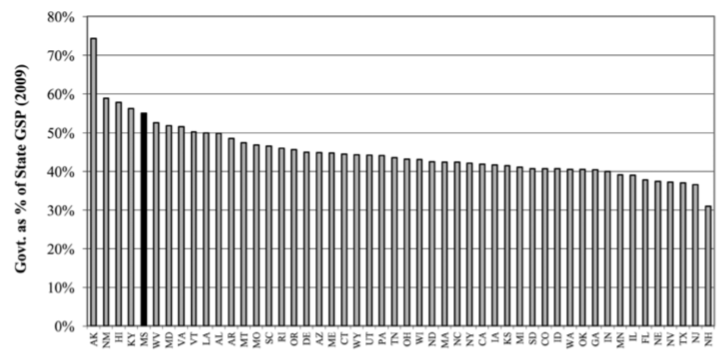
This ranking gave Mississippi the fifth largest government, behind Alaska, New Mexico, Hawaii, and Kentucky. Looking at our neighbors, government controlled between 47-50 percent of the economies in Alabama, Arkansas, and Louisiana. It is 43 percent in Tennessee.
For those that might blame federal spending, if we look at just state and local spending, Mississippi would actually move up to the fourth highest share of government control. So the federal government isn’t to blame.
Government is growing in Mississippi
Interestingly, it has not always been this way. Throughout the 1990s, government control of the economy in Mississippi ranged from about 40-45 percent.
It sat at around 45 percent at the turn of the century. And has been trending in the wrong direction since that time.
Does this matter?
Mississippi has an outsized government. It is larger than our peers. But do we need it? After all, Mississippi is a poor state and largely rural.
Regardless of the size of the state, it is problematic when resources must be dedicated to political favor seeking and lobbying rather than private sector activities. The shift is from entrepreneurship and toward lobbying. That may benefit an individual or a single company, but it does not benefit the economy.
And we have data to show the correlation between economic freedom, which includes personal choice, voluntary exchange, free enterprise, and property rights, and prosperity.
When looking at the Economic Freedom of North America index and per capita income, we see a direct and clear trend. The freer the state, the greater the income.
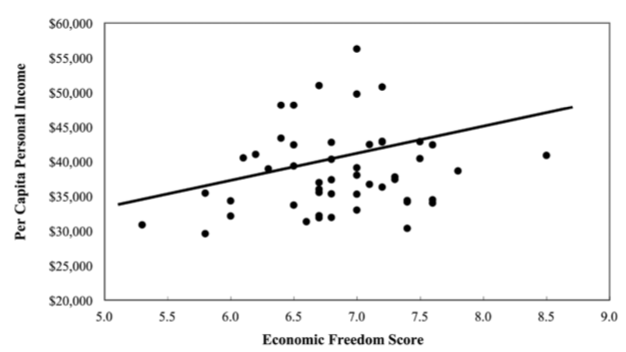
Those who live in states with the highest per capita income live in the freest states. The poorest states rely on the government. It is not by accident.
People vote with their feet
Beyond the data and freedom indexes from the likes of Fraser, Cato, or Heritage, can you make the argument that people like the high regulation, union friendly status of states like California or New York? After all, Manhattan and San Francisco (minus the used needles and feces on the streets) are highly desirable places to live. And as a result, their cost-of-living is among the highest in the country.
And while those locations might be desirable, net migration tells a different story. We can throw out the data, the policy wonks, and the studies and we still have this graphic.

We are free to live where we’d like in this country. And people are moving to the states that do well on the various measures of economic freedom. As a result, they are moving out of states that do not.
Do people intentionally look at these reports and determine that is where they are going to live? No, probably not. Rather, they are moving to the states with opportunity, with growth, and where the cost-of-living is reasonable. (Hint: states with less burdensome regulations.)
Here is the net migration between 2016 and 2017 among the five freest and five least free states, according to the Economic Freedom of North America index.
| State | Freedom Index Ranking | Net Migration |
| New Hampshire | 1 | 3.5 |
| Texas | 2 | 2.8 |
| Florida | 3 | 7.8 |
| South Dakota | 4 | 2.3 |
| Tennessee | 5 | 6.1 |
| Hawaii | 45 (tie) | -9.5 |
| Mississippi | 45 (tie) | -3.3 |
| New Mexico | 47 (tie) | -3.6 |
| West Virginia | 47 (tie) | -5.7 |
| California | 49 | -3.5 |
| New York | 50 | -9.6 |
The numbers speak for themselves. If we want to increase prosperity and attract new residents to the state, it starts with enacting policies that encourage and promote the principles of economic freedom.
In this edition of Freedom Minute, we talk about the start of the NFL season, declining ratings and revenue, Nike, Colin Kaepernick, and culture.
This past session, Mississippi joined a number of other states in reforming civil asset forfeiture laws.
Lawmakers allowed the administrative forfeiture provision to sunset, meaning the previous law ceased to be in effect at the end of June. In response, Mississippi Center for Public Policy and the Mississippi Justice Institute joined with Empower Mississippi and national conservative organizations in thanking the legislative leadership for ending administrative forfeiture in the state.
Administrative forfeiture allows agents of the state to take property valued under $20,000 and forfeit it by merely providing the individual with a notice. An individual would then have to file a petition in court to appeal. This had the net result of requiring the individual to pay an often-large legal bill to get his or her property back. This, naturally, has an outsized negative effect on low-income households.
Asset forfeiture reforms
Until 2017, Mississippi was the wild west of sorts when it came to civil asset forfeiture. In 2015, the Mississippi Bureau of Narcotics, along with local police departments, seized nearly $4 million in cash.
They seized amounts as low as $75. They seized trucks, cars, ATVs, riding lawnmowers, utility trailers, and 18-wheelers; an arsenal of assorted handguns, shotguns, and rifles; cell phones, cameras, laptops, tablets, turntables, and flat screen TVs; boat motors, weed eaters, and power drills; and one comic book collection, according to a report from Reason.
And that does not include numbers from police departments that work independently of the Bureau of Narcotics. Until 2017, they didn’t track or publish asset forfeiture data.
Moreover, family members, especially parents, often have their cars or other property seized for the alleged crimes of their children. This happens even though the parents are not connected to the illegal activity. For example, in 2015, the Desoto County Sheriff's Department agreed to return a 2006 Chevy Trailblazer owned by the mother of the petitioner, Jesse Smith, in exchange for $1,650.
In 2017, the legislature provided needed reforms. Now, seizing agencies must obtain a search warrant issued by a judge within 72 hours of seizing property. And all forfeitures are posted on a publicly accessible website. Repealing administrative forfeiture is another important step.
Voters oppose civil forfeiture
Polling shows a large cross-section of Mississippi voters oppose the practice of civil asset forfeiture.
According to a poll from 2016, 88 percent of voters oppose civil forfeiture, including 89 percent of Republican voters. Every category of Mississippi voter identified in the poll — by race, age, sex, political party and district — is against police taking property from people not convicted of a crime.
By reforming the civil forfeiture system, Mississippi is adopting policies that are in-line with voters in the state and reforms that other states have enacted.
A new report shows taxpayer funded film incentives continue to perform poorly nationwide.
The report, Calling Cut on Film Incentives, was recently released by the Beacon Center of Tennessee and focuses on the poor investment for taxpayers in the Volunteer State. While there has never been an official ROI calculation from the state of Tennessee, the report looked at three key points:
- 40 percent of the subsidized projects made less at the box office then they received in subsidies
- Several of the subsidized projects only spent a small share of their budget in state
- Many programs hold the state, i.e. taxpayers, hostage and threaten to move if they do not receive additional subsidies, similar to sports teams and corporations
A similar story in Mississippi
Mississippi has a similar experience with film incentives. A 2015 PEER report shows taxpayers receive just 49 cents for every dollar invested in the incentives. For those looking at a bright side, we are actually “doing better” than many other states.
This includes our neighbors in Louisiana, who recover only 14 cents on the dollar. They also have one of the most generous programs in the country; it was unlimited until lawmakers capped it a couple years ago. (Other reports show the Pelican State recovering 23 cents on the dollar, either way a terrible investment.)
Good for production, not the economy
Beyond Mississippi, Tennessee, and Louisiana, film incentives are universally a poor investment throughout the country. Numerous studies have been conducted on film incentives. All sobering for those worried about taxpayers. Here is a review of the return per tax dollar given, from 2008 through 2013. In these third-party studies, covering 12 different states, there was not a program that returned 50 cents on the dollar (never mind actually made money).
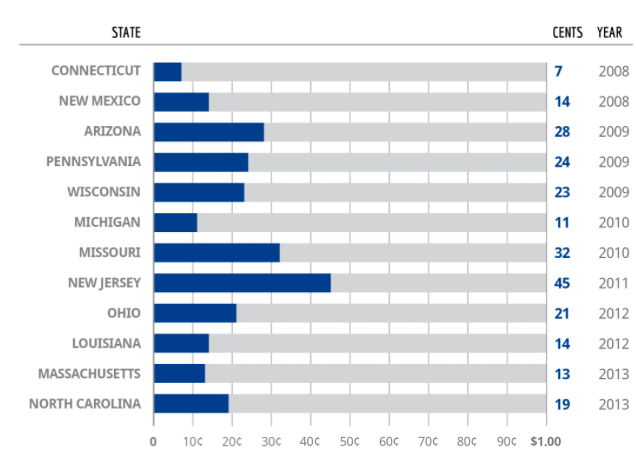
Source: John Locke Foundation
Since this chart was published, studies on similar programs in Florida, Virginia, and West Virginia have shown similar results. No program had a positive ROI.
If an individual was investing their own money, they would never make any of these deals. But is has been said, and proven, many times that no one spends their own money more carefully than that person.
A move in the right direction
Mississippi lawmakers have begun to scale back on the “handouts to Hollywood.” Last year, lawmakers chose not to extend the non-resident payroll portion of the incentives program. This previously allowed for a rebate on payroll paid to cast and crew members who are not Mississippi residents.
But we still have two incentives on the books. One is the Mississippi Investment Rebate, which offers a 25 percent rebate on purchases from state vendors and companies. The other is the Resident Payroll Rebate, which offers a 30 percent cash rebate on payroll paid to resident cast and crew members.
And old habits die hard. The House voted to bring back the incentives this past session. The bill didn't make it through the Senate and that incentive is still dead.
Mississippi is moving in the right direction and they are joined by other states. While all but six states had film incentives a decade ago, the number is now up to 19. Mississippi can be number 20 by removing the incentives currently on the books.
Just because other people are doing it
One of the common prescribed reasons for why need film incentives is because it’s “good” for the state to have movies filmed here. As is often the case in government, we focus on the inputs. How many films are made here? What movie star was in Mississippi? That is nice, but the focus should be on outcomes.
The other common argument is that other states are doing it. That is the point the Beacon Center made about producers holding the state hostage and threatening to move. Producers in Mississippi have raised the same point. And I am sure they have in every other state where film incentives are threatened.
However, simply because another state is wasting money does not mean Mississippi should join them.
Corporate welfare is never a good idea. It’s an even worse idea when you know we are losing money and you want to continue with or resurrect such a program. Our goal should be to have the most competitive business climate in the country. The tax breaks that a few chosen industries or companies receive should be made available to all. When we do that we will remove the need for taxpayer funded incentives.
Tiger Woods is taking heat from the media for just wanting to play golf and not taking their bait.
USA Today columnist Christine Brennan was highly critical of Tiger Woods earlier this week for his refusal to weigh in on the politics of the day.
Brennan, along with several reporters at Tiger’s press conference following a recent tournament, seemed upset because he would not opine on the subject of Donald Trump and race relations, particularly “as a man of color.”
It’s as if every athlete now has an obligation to share personal views on every subject.
The constitutional right to free speech gives Tiger the right to say nothing at all. Perhaps he has a different view or a less popular one. Perhaps he voted for Trump. Maybe he didn’t vote at all. Regardless, he is not required to provide his views on politics or society.
Woods has said that to expect him to have a say on everything having to do with blackness in America because his father was black is disrespectful to his Asian mother. Because his mother is Asian, is Tiger compelled to weigh in on trade relations and Harvard’s admission policies?
Maybe Tiger just wants to talk about golf. Maybe golf fans just want hear him discuss golf. Rather than criticize Tiger for refusing to weigh in on political matters, he should be thanked for having the discipline and the good sense to let everyone enjoy the sports they like.
The USGA, PGA, LPGA, and their fans appear to understand golf is a sport, not a political weapon. Why doesn’t the rest of the sports world?If we are in the mood for political commentary, we can switch the channel to any number of networks that dedicate 24 hours every day to the subject.
It seems the governing bodies of golf understand something fundamental: The sports industry relies on fans, spectators, viewers, and players. Without attendees and viewers, the business models fall apart. Like any healthy business, the customer is at the center.
The NBA and NCAA’s boycott of North Carolina over the transgender bathroom bill and the NFL’s handling of the national anthem issue are recent examples of leagues alienating fans by involving themselves in politics.
With this is mind, why would a sports league attempt to use its sport as a weapon for politics? Sports fans come from all political persuasions. Why jeopardize your relationship with the customer over political issues?
We’ve been asking that question of ESPN, NBA, NFL, NCAA, and other sports organizations of late. Using the resources of a sports organization or the resources of a media company to advance an agenda seems a flawed strategy, and there is data emerging to support this.
In nearly every measured television market, center right-viewers are leaving ESPN. Deep Root, a TV data service, analyzed 43 markets across the US and compared 2015 audiences with 2016 audiences. In 36 of the 43 markets, ESPN viewership had become more liberal—between 5 percent and 27 percent more liberalin 2016 than in 2015.
In other words, center-right viewers left the network.
Those of us who want our sports delivered free of political commentary salute Tiger Woods and the sport of golf. Now please have a talk with your organizational cohorts at the NFL, NBA, and NCAA. We sports consumers/fans would like to have our sports back.
Sports have always been a common denominator in our culture. Regardless of race, age, sex, education, or political affiliation, sport is a unifier. That needs to be respected.
With all of the balkanization that exists in the other parts of our lives, let’s leave sports alone. We’ve already surrendered higher education, arts, music, media, and filmmaking to progressives. They can’t have sports, too.
